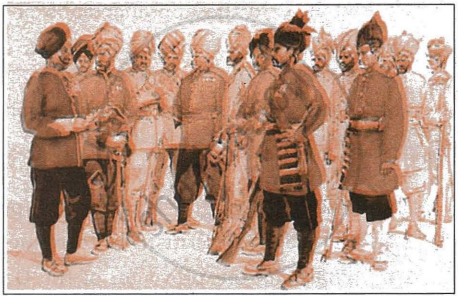Advertisements
Advertisements
Question
Study the picture and answer the following questions:

- Who are the persons in the picture? How were they treated by their British counterparts?
- State any three grievances they had against the British.
- What changes were brought in their status after the Uprising of 1857?
Solution
- Indian Sepoys in the British Army. They were underpaid, undernourished, and living in substandard conditions. British military authorities barred the sepoys from wearing caste or sectarian marks, beards, or turbans, and they showed little concern for the sepoys' feelings.
-
- Indian soldiers were dissatisfied with their low salaries and limited opportunities for advancement. All of the army's highest positions were designated exclusively for British soldiers.
- The troops were not appropriately distributed. There were no British armies in crucial cities such as Delhi or Allahabad. The Indian Sepoys were obliged to serve in locations far from their homes, without their families.
- The officers handled the soldiers like lowly servants. Racial discrimination was widespread, leading to increased unrest among Indian Sepoys.
- The Indian troops' wages were decreased and were insufficient to sustain their families. An English soldier was paid more than eight times the Indian sepoy, despite the fact that his tasks were equal. Furthermore, they had no hope of promotion. Subedar was the highest rank that an Indian could hold. Artillery and other vital weaponry were exclusively available to English men.
APPEARS IN
RELATED QUESTIONS
The Indian Nationalists described the Great Uprising of 1857 as the First War of Independence. with reference to this, answer the following question:
The Revolt of 1857 is also known as the Sepoy Mutiny.
Mention any three military causes which led to the uprising.
Which of the following Acts was resented by the Indian sepoys?
State two effects of the British defeat in the First Afghan War on the Indian soldiers.
State two effects of the Punjab defeat in the First Afghan War on the Indian soldiers.
How was the Army organised after the First War of Independence?
Imagine you were a Subedar in the army hailing from a landed family from Awadh. State the grievances your father had against the British.
What was the provision of the General Service Enlistment Act which was resented by the Indian soldiers? Why was it resented?
